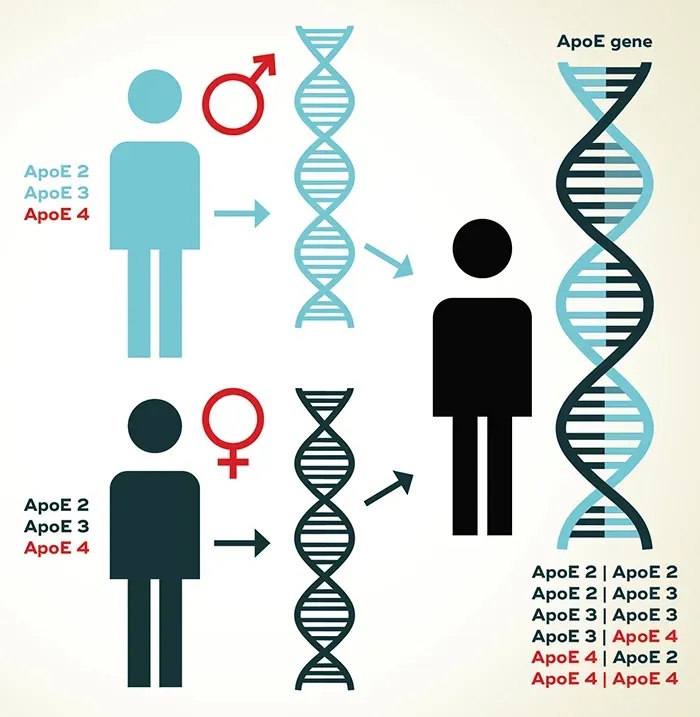Genetic mutation dementia risk is becoming a pressing concern, particularly among men, as recent studies reveal alarming correlations between specific genetic variants and dementia prevalence. Research indicates that males carrying the H63D variant of the HFE gene, associated with the body’s iron regulation, face a significantly higher dementia risk—potentially doubling or even quadrupling their chances. These findings emerge from an extensive analysis conducted by Monash and Curtin Universities, highlighting the need for awareness around dementia genetic variants that disproportionately affect men. While women appear unaffected, understanding the mechanics behind this disparity could unlock new preventive avenues. Incorporating a healthy lifestyle may mitigate some dementia risks; however, further research is necessary to define the exact pathways influenced by such genetic mutations.
The risk of developing dementia linked to genetic factors is a growing topic in health discussions. Recent findings suggest that certain hereditary traits, especially in men, escalate the likelihood of cognitive decline. Among these genetic markers, the HFE gene, particularly its H63D variant, plays a crucial role, especially in the context of haemochromatosis dementia. Men with this mutation are at a heightened risk, a trend that has raised numerous questions about genetic predispositions and their implications for public health. This exploration into dementia risk factors reflects the broader scholarly focus on how genetic variants can impact overall brain health.
Understanding Genetic Mutations and Dementia Risk
Genetic mutations play a critical role in understanding the risk factors associated with dementia, particularly in men. Recent studies, including one from Monash and Curtin Universities, reveal that specific genetic variants can significantly increase the likelihood of developing dementia. For instance, men with two copies of the H63D variant in the HFE gene are reported to be up to four times more susceptible to dementia than men without the mutation. This stark contrast highlights the importance of genetic screening and awareness around inherited risk factors.
With the identification of dementia genetic variants like the H63D variant, it becomes imperative to engage in preventive measures. While men who carry this mutation cannot change their genetic makeup, understanding their risk allows for targeted lifestyle adjustments. Regular monitoring and consultations with healthcare professionals can help manage the factors that may compound the risk of dementia, including diet and exercise, hence cultivating a proactive approach towards health.
HFE Gene and Its Role in Dementia
The HFE gene is critical for maintaining the body’s iron levels, but its abnormalities are linked to an increased risk of dementia, particularly in older men. Research has shown that the presence of two copies of the H63D variant in this gene correlates with a substantially higher risk of developing cognitive impairment. Interestingly, this risk appears to be male-specific, raising questions about the genetic and biological factors contributing to this disparity.
Despite the significant role of the HFE gene in dementia risk, researchers have found no direct link between iron levels and cognitive decline. This observation suggests that other underlying mechanisms, such as inflammation or cellular damage, may be influencing the increased risk observed in men. Understanding these pathways could lead to more effective targeted therapeutic strategies, ultimately paving the way for personalized medicine approaches in dementia prevention.
The Psychological Impact of Genetic Testing for Dementia
For men who undergo genetic testing and discover they carry the H63D variant of the HFE gene, the psychological ramifications can be profound. Knowing that they have an increased risk of developing dementia may lead to anxiety, depression, or a sense of helplessness in terms of their health future. It is crucial for healthcare providers to offer psychological support and counseling to those who receive alarming results from genetic tests, ensuring they understand both the risks and the lifestyle changes that may mitigate them.
Furthermore, the process of genetic testing can empower individuals by providing them with information to make informed choices about their health. While having a genetic marker that predisposes them to dementia may initially seem daunting, it can also prompt proactive health management strategies. This includes regular check-ups, lifestyle changes, and engaging in mentally stimulating activities, all of which can contribute to better overall health outcomes.
Addressing Male-Specific Dementia Risks
Men exhibit a unique risk profile when it comes to dementia, particularly linked to specific genetic mutations such as those found in the HFE gene. The recent findings of studies indicate that men with two copies of the H63D variant are at a noticeably increased risk, underscoring the necessity for tailored health interventions that specifically address the male demographic. Recognizing these variants can lead to better preventative measures and awareness of potential symptoms among men.
In light of this male-specific risk, public health initiatives must focus on educating this demographic about the signs of dementia and the significance of genetic testing. Moreover, creating support networks for men who are at risk could lead to a better understanding of the disease and improve the acceptance of medical consultations. Community programs promoting healthy living practices could also help lower the risk of dementia in men carrying such genetic variants.
Exploring the Connection Between Haemochromatosis and Dementia
Haemochromatosis, a condition caused by excessive iron absorption due to mutations in the HFE gene, is a significant concern, particularly in relation to cognitive health. Research indicates that this genetic disorder can be linked to an increased risk of dementia, emphasizing the relevance of monitoring individuals with this condition for cognitive decline. The association between haemochromatosis and dementia highlights the importance of understanding underlying mechanisms that contribute to both the iron overload and its neurological consequences.
Consequently, healthcare professionals must adopt a multidisciplinary approach when dealing with patients diagnosed with haemochromatosis. Regular screenings for cognitive function alongside standard treatments for iron overload could lead to timely interventions that might mitigate the risks of dementia. Such proactive measures are essential in enhancing the quality of life for those affected by both conditions.
The Importance of Lifestyle in Managing Dementia Risk
While genetic factors such as the H63D variant in the HFE gene can exacerbate dementia risk, lifestyle choices also play a crucial role in management and prevention. Engaging in healthy habits such as regular exercise, a balanced diet, and mental stimulation can significantly impact cognitive health. By adopting these behaviors, men who are aware of their genetic predisposition can take actionable steps to mitigate their risk of developing dementia.
Moreover, maintaining a healthy lifestyle not only benefits cognitive function but overall physical health, creating a comprehensive strategy that includes monitoring for existing conditions influenced by genetic factors. Men at risk should consult healthcare professionals about personalized lifestyle plans that incorporate nutrition, exercise, and mental health strategies to create a robust defense against potential cognitive decline.
Future Directions in Dementia Research
The exploration of genetic factors contributing to dementia, particularly in men carrying specific mutations such as the H63D variant, represents a promising avenue for future research. Scientists are actively investigating the mechanisms by which these genetic anomalies impact cognitive function and lead to the development of dementia. Understanding these biological processes is essential for designing targeted therapies that address the unique challenges faced by individuals predisposed to dementia.
Current research efforts are not just focused on men but also aim to elucidate why women do not exhibit the same increased risk from the HFE gene mutations. Comparative studies across diverse populations will be foundational in developing a comprehensive understanding of dementia’s complex genetic landscape. As findings unfold, there may be significant implications for preventive strategies and therapeutic interventions tailored to genetically at-risk individuals.
Strategies for Men to Reduce Dementia Risk
For men identified as having an increased risk of dementia due to genetic mutations, implementing preventative strategies becomes crucial. It is recommended that they embrace proactive health measures, including regular physical activity, cognitive exercises, and a diet rich in antioxidants and healthy fats. These lifestyle changes can enhance brain health and help mitigate the cognitive decline associated with genetic predispositions.
In addition, regular health check-ups and screenings are vital for monitoring any emerging symptoms of dementia or associated health conditions. Establishing a support system that encourages adherence to healthy practices can also play a pivotal role in fostering cognitive resilience among men at risk. Sharing experiences and challenges within community health programs can empower individuals to take charge of their brain health.
Public Awareness of Genetic Factors in Dementia
Increasing public awareness of the genetic factors contributing to dementia is crucial for early detection and intervention. Campaigns aimed at educating individuals about the risks associated with specific genetic mutations, such as those linked to the HFE gene, can enable more proactive healthcare engagement. Public health initiatives should consider incorporating genetic counseling services that can guide those at risk, particularly men, in understanding their genetic health.
Raising awareness about how genetics intersect with lifestyle choices in the context of dementia can empower individuals to make informed decisions regarding their health. An informed public can work alongside healthcare providers to develop preventive strategies tailored to their unique risk factors and lifestyle challenges, ensuring that both genetic information and lifestyle adjustments are key components of dementia care.
Frequently Asked Questions
What is the connection between the HFE gene and dementia risk in men?
The HFE gene is linked to dementia risk, particularly in men over the age of 70 who carry the H63D variant. Studies suggest that these men are at least twice as likely, and potentially up to four times more likely, to develop dementia if they possess two copies of this genetic mutation.
How does the H63D variant affect dementia risk in men?
Men with two copies of the H63D variant in the HFE gene have a significantly increased risk of developing dementia. This genetic mutation is believed to influence brain pathways that may lead to increased inflammation or cellular damage, both of which could contribute to dementia.
Are women at risk for dementia related to genetic mutations in the HFE gene?
No, current research indicates that women do not exhibit the same elevated dementia risk associated with the HFE gene mutations. The reasons for this gender difference are not yet fully understood and require further investigation.
What lifestyle changes can influence dementia risk associated with genetic mutations?
While genetic mutations like the HFE gene variant cannot be altered, adopting a healthy lifestyle can help mitigate dementia risk. Recommended practices include maintaining a balanced diet, engaging in regular physical activity, reducing alcohol intake, and staying mentally active.
What role do genetic variants play in dementia risk?
Genetic variants, such as those found in the HFE gene, can significantly impact dementia risk. For instance, men with the double H63D variant are at a higher risk; however, researchers emphasize that environmental and lifestyle factors can also contribute to overall dementia risk.
Why is understanding genetic mutation dementia risk important?
Understanding genetic mutation dementia risk, especially with regard to the HFE gene, is crucial for developing personalized prevention and treatment strategies. Insight into why men with this variant are at increased risk could lead to targeted interventions to reduce dementia incidence.
What further research is needed regarding HFE gene dementia risk?
Further research is essential to explore the unknown mechanisms linking the HFE gene and dementia risk, particularly why only men are affected. Additionally, studies in diverse populations are needed to assess the generalizability of these findings.
Can iron levels directly impact dementia risk related to the HFE gene?
Current studies indicate that while the HFE gene regulates iron levels, there is no direct correlation between iron levels and dementia risk. This suggests that the genetic mutation impacts dementia through other pathways, such as inflammation and potential brain injury.
| Key Point | Details |
|---|---|
| Increased Risk in Men | Men with a mutation in the HFE gene face a doubled risk of dementia. |
| Genetic Variant H63D | Those with two copies of the H63D variant are up to four times more likely to develop dementia. |
| No Effect on Women | The mutation appears to affect men only; women are not at risk. |
| Study Background | Research conducted by Monash and Curtin Universities based on data from thousands of Australians and Americans. |
| Potential Treatment Avenues | Brain pathways altered by the mutation may have treatable effects. |
| Lifestyle Recommendations | Emphasizes healthy living to potentially offset genetic risk factors. |
| Further Research Needed | More studies are necessary to explore risks in other populations and the underlying mechanisms. |
Summary
Genetic mutation dementia risk is a substantial concern, particularly for men who carry the H63D variant in the HFE gene. This mutation significantly increases the chances of developing dementia, with the potential risk being up to four times greater for those with two copies. Understanding these genetic factors and their implications can help pave the way for tailored prevention and treatment strategies. Additionally, adopting a healthy lifestyle may help mitigate some of these genetic risks, highlighting the importance of ongoing research in this critical area.



